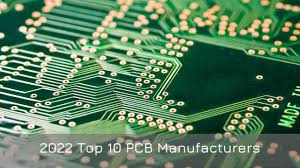The importance of PCBs for the operation and structural integrity of a piece of electronic equipment is paramount and makes selecting the right manufacturer equally critical.
The firm responsible for production of your circuit boards will have a direct impact on the performance and longevity of the product created as a result. The following are the primary characteristics to take into account when making a choice regarding PCB manufacturer.
Capabilities: when selecting an organization to manufacture the specified types of PCBs, it is crucial to consider what they are capable of doing technologically. For example, many small electronic devices cannot function properly without a PCB, with a single-sided one being the most basic option. More complex electronics require a double-sided one, while most technological devices exist as a result of a multilayer PCB. Some electronics are extremely complex, featuring up to 48 layers in their PCBs, a challenge many manufacturers will not be able to meet. Furthermore, the manufacturer’s capabilities in terms of the technology used may be insufficient. Nearly all available products use either through-hole technology or surface-mount technology, but the switch between the two can cause various processes to become more complex, for example, the use of HDI PCBs and SIP methods.
Standards: There are multiple international standards which the product must comply with, such as ISO 9001 and ISO 14001 and should have the relevant certification requirements. In addition to these general standards, it is important to identify the specific ones, such as IPC-6012 for military and aerospace applications. These products require extra reliability.
Timing: Finally, it is important to know the manufacturer’s lead times and time requirements for production of circuit boards of different complexity. Typically, a prototype for any product will take 5-7 days, and the manufacturing process will take 2-3 weeks.
NRE: Non-recurring engineering charges, also known as NRE fees, are the one-time payments necessary to make a particular product ready for large-scale production. Consider what they are when selecting your manufacturer, as the amount will impact the cost of a product.

Assessing Cost-Effectiveness
Cost is one of the significant aspects of the decision-making process. However, the assessment of the cost must go beyond looking at the unit price of production. One should always consider whether it is cost-effective to work with a particular manufacturer. “Cost-effectiveness would include looking at overall cost, including setup fees, material costs, and costs for regarding”. In addition, one should try to negotiate with several manufacturers and ask them to provide the quotes to be able to compare the terms.
Verifying Customer Service and Technical Support
Considering that PCB production requires utmost precision and technical support, a reliable PCB manufacturer is expected to have customer service and support. “Communication channels must be well-defined so that if any part of the production process does not meet a client’s approval they can communicate it to a reliable source”. Therefore, one should consider whether the manufacturer has support services and experts capable of responding to all the queries. It is vital as the manufacturer may assist in the organization of the production process. The more support the manufacturer can provide, the better.
Analyzing Reviews and Reputation
One should do quick research on the internet and try to understand whether clients of the manufacturer consider it reliable. The manufacturer’s website may contain some articles describing the satisfied customer’ cases. Alternatively, one may check the industry-specific forums or look at the reviews on the websites that accept reviews of electronic product manufacturers. A manufacturer that has satisfied many reputed clients is a good candidate for consideration.
